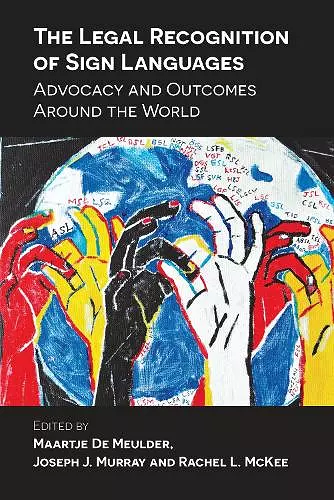The Legal Recognition of Sign Languages
Advocacy and Outcomes Around the World
Joseph J Murray editor Maartje De Meulder editor Rachel L McKee editor
Format:Paperback
Publisher:Multilingual Matters
Published:17th Jun '19
Should be back in stock very soon

The most widely representative and contemporary collection on the legal status of sign languages
This book presents the first comprehensive overview of national laws recognising sign languages, their impacts and the advocacy campaigns which led to their creation. Each chapter is grounded in a collaborative writing approach between deaf and hearing scholars and activists involved in legislative campaigns.
This book presents the first ever comprehensive overview of national laws recognising sign languages, the impacts they have and the advocacy campaigns which led to their creation. It comprises 18 studies from communities across Europe, the US, South America, Asia and New Zealand. They set sign language legislation within the national context of language policies in each country and show patterns of intersection between language ideologies, public policy and deaf communities’ discourses. The chapters are grounded in a collaborative writing approach between deaf and hearing scholars and activists involved in legislative campaigns. Each one describes a deaf community’s expectations and hopes for legal recognition and the type of sign language legislation achieved. The chapters also discuss the strategies used in achieving the passage of the legislation, as well as an account of barriers confronted and surmounted (or not) in the legislative process. The book will be of interest to language activists in the fields of sign language and other minority languages, policymakers and researchers in deaf studies, sign linguistics, sociolinguistics, human rights law and applied linguistics.
Only a small number of the thousands of endangered languages are legally recognized or protected, but among them, the 19 sign languages discussed in this volume show how acknowledgement in national legislation reveals a significant advance in 21st century language management. This collection detailing the way this happened is a major contribution to the study of language policy.
* Bernard Spolsky, Emeritus, Bar-Ilan University, Israel *Formal recognition campaigns have recently elevated the 140-year battle for Deaf children’s rights to access their sign languages, cultures and Deaf educators to new levels of political discourse. The authors of this book have succeeded magnificently in illustrating current progress and highlighting some of the obstacles which remain to be overcome.
* Paddy Ladd, author of Understanding Deaf Culture *This is a timely and important book. It provides the first comprehensive analysis of the growing legal recognition of sign languages internationally, as well as the wider social and political advocacy movements underpinning these developments. Drawing together deaf and hearing contributors, academics and activists, this volume traverses the fields of language rights, language policy, and sociolinguistics. Expertly curated, it will be an essential guide and benchmark for academic and legal discussions of sign languages for years to come.
* Stephen May, University of Auckland, New Zealand *This book gives the reader a deep understanding of the complex process of sign language recognition. It serves as a wonderful source for those who plan to advocate for sign language recognition or who would like to improve the current status and legislation of sign language and rights of its users in their respective countries.
* Markku Jokinen, Finnish Association of the Deaf, Finland *This will be a welcome addition to the library of anyone interested in sign language status, language planning, advocacy, and broader areas of legal strategy and rights for deaf people and other sign language users from both language rights and disability rights perspectives.
-- J. Albert Bickford * Sign Language Studies, Vol. 20 No. 4 Summer 2020 *This is an absolutely fantastic book and it is impossible to even start describing
its richness. Read it!
This book is obligatory for those interested in matters regarding the strengthening and protection of the rights of deaf communities and their languages all over the world. The book is a fitting tribute for those campaigners who have fought for the ‘legal recognition of sign languages’ as official languages in different countries.
-- Language in Society 49 (2020) * Roberto De Freitas Junior, University of Rio de Janeiro, Brazil *The text is an extremely useful and valuable resource which offers new information and fresh insights. One of the major strengths of this publication is the fact that the individual chapters not only provide historical perspectives but also recount very recent social events and movements. I particularly enjoyed reading about the recognition of those sign languages that are relatively under-represented in the language planning literature.
-- Hanna Jaeger, Institut fur Angewandte Linguistik Leipzig, Germany * Language Problems and Language Planning 44ISBN: 9781788923996
Dimensions: 234mm x 156mm x 18mm
Weight: 540g
352 pages